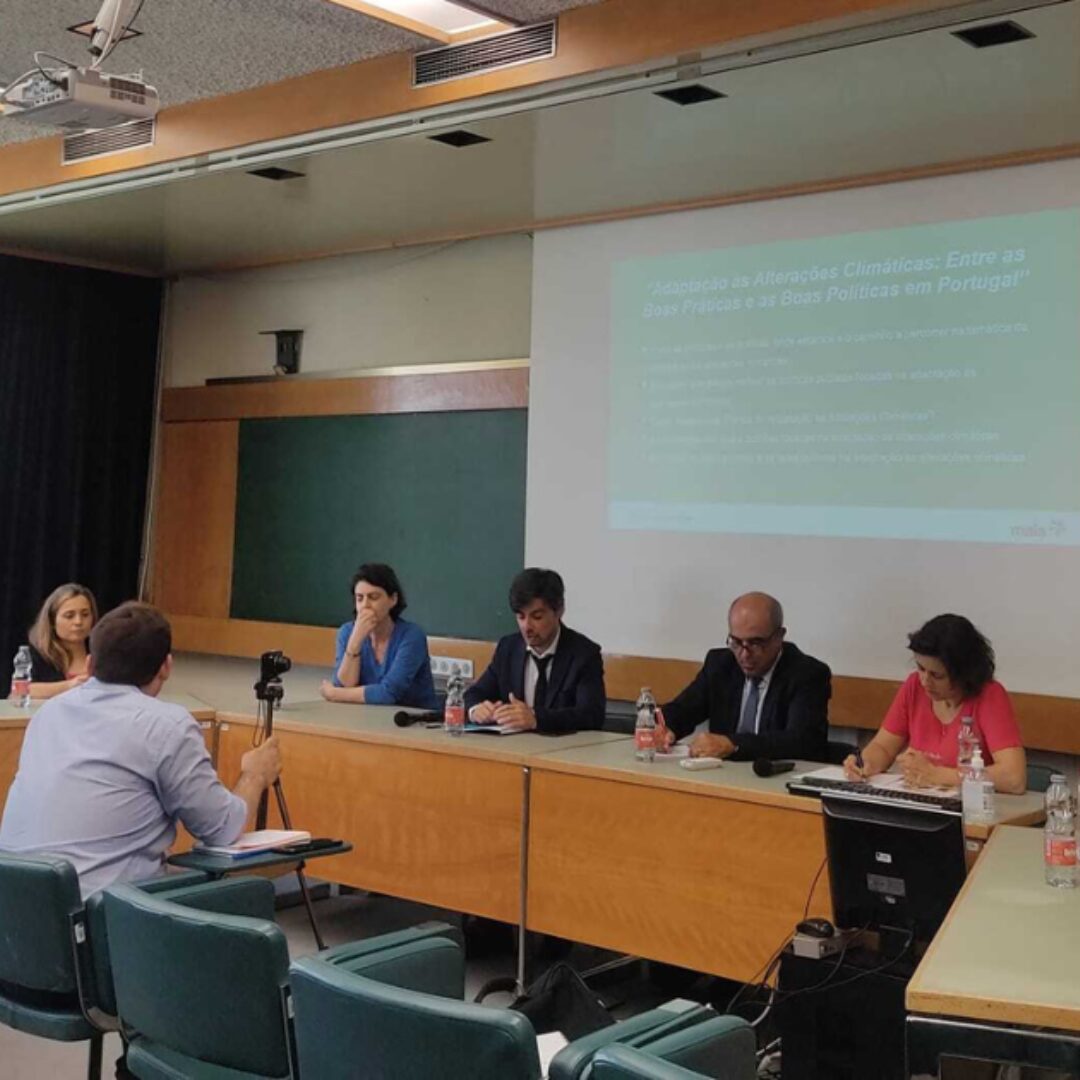Overcoming Constraints in Climate Change Adaptation: Insights from the MAIA Roundtable in Portugal

Lessons Learnt
The first MAIA Roundtable was developed on May 18 in the LNEC (National Civil Engineering Laboratory) in Lisbon, Portugal. The theme of the event was “Climate Change Adaptation: Gaps from Good Practices to Good Policies in Portugal” and it gathered relevant policymakers and institutional representatives that have a significant influence at the regional and national level in the topic of climate change adaptation. In particular, the roundtable focused on the following main topics:
- Between policies and practices: where we are and where we should be in terms of adaptation to climate change.
- Guidelines that should guide public policies focused on adaptation to climate change.
- How to implement climate change adaptation plans?
- The limitations of current policies focused on adaptation to climate change.
- Examples of good practices and good policies in adaptation to climate change.
The participants of the Roundtable included Ana Estela Barbosa (from the National Civil Engineering Laboratory), João Medina (from Sociedade Portuguesa de Inovação), Ana Daam (from Portuguese Environmental Society), Ana Sofia Rizzone (from Directorate for Territory), Rosa Onofre (from Alentejo Coordination and Development Committee), Rita Cardoso (from Dom Luiz Institute), António Bota (from Almodôvar Municipality) and Carla Castelo (researcher in Climate Change).
During the Roundtable, the participants acknowledged the existence of significant constraints in effectively implementing climate change adaptation policies. One key constraint highlighted was the delay in implementing the policies at the practices level. This delay could be attributed to several factors, including the delayed inspections and supervision of policy implementation in Portugal. The delay in inspections and supervision of policy application can have adverse effects on climate adaptation efforts. It can hinder the timely execution of adaptation measures and compromise the effectiveness of policies designed to address climate change impacts. The participants recognized the need for more efficient and expedited processes to ensure that policies are implemented promptly and effectively.
To overcome these constraints, it was suggested to develop a more streamlined and proactive approach to putting some policies into practice. This could involve allocating adequate resources and personnel to carry out inspections, establishing clear timelines for implementation, and implementing monitoring systems to track progress and compliance.
Furthermore, participants in the Roundtable emphasized that certain entities responsible for monitoring and supervising policy implementation in Portugal often provide unclear responses, leading to further delays in the operationalization of climate change adaptation measures. This lack of clarity can hinder progress and generate obstacles in the effective implementation of policies.
When entities involved in monitoring and supervision fail to provide clear guidance or instructions, it can create confusion and uncertainty among stakeholders responsible for implementing climate change adaptation projects. This lack of clarity may result in inefficiencies, misinterpretation of requirements, or even the postponement of necessary actions.
Another issue highlighted in the Roundtable is the lack of human resources in the entities responsible for developing policies in the topic of climate change in Portugal. Both Alentejo Coordination and Development Committee and Portuguese Environmental Society have emphasized this issue as a significant factor causing delays in numerous activities. Portuguese Environmental Society, for example, states that approximately 40% of positions in the field of climate change adaptation and mitigation remain vacant due to various reasons, including budgetary constraints and institutional centralization.
In addition, there has been a significant increase in the number of studies focused on climate change adaptation and mitigation in Portugal. However, there is a challenge in fostering dialogue between research institutions and policymakers. Dom Luiz Institute has emphasized the urgent need to establish closer institutional communication, not only at the higher levels of hierarchy but also in a bottom-up approach. While decision-making ultimately depends on higher-level approval, the interaction at lower levels of the hierarchy appears to be more dynamic and effective in supporting decision-makers.
Another issue raised during the meeting pertains to the accessibility of reliable information at the appropriate scale. On one hand, obtaining data from entities like the Portuguese Institute for the Ocean and Atmosphere (IPMA) is extremely challenging, and on the other hand, there is a significant lack of information at the local level, such as information related to land use and vegetation.
Nevertheless, it is important to note that despite these limitations and obstacles, significant progress has been achieved in the realm of adaptation and mitigation policies. Notable examples include the National and Regional Spatial Planning Programs, the Landscape Transformation Program, and the Landscape Planning and Management Program. Portuguese Environmental Society has also emphasized that the inclusion of climate change-related goals in Portuguese law for the Horizon 2030 marks a groundbreaking milestone.
(0) Comments
There is no content